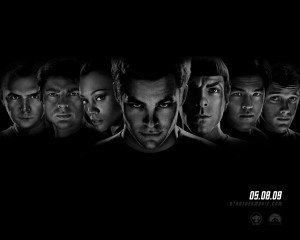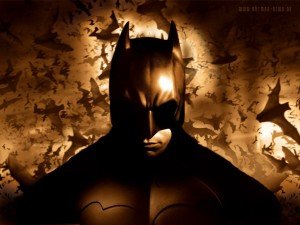Prequels, Remakes And Re-Dos, Part 1: The Best Of The Best
by Sean Comer
 If you know your history, then you see the summer-blockbuster history that the next four weeks will unfold.
If you know your history, then you see the summer-blockbuster history that the next four weeks will unfold.
On July 3, Sony takes a gamble that's already had it lambasted on a few fronts when its major reboot "The Amazing Spider-Man" hits theaters to reclaim the web-slinger dignity that All-Singing, All-Dancing Crap of the World Peter Parker soft-shoed into submission when 2007's "Spider-Man 3" made a metric ton of money debasing a beloved piece of Spidey lore and making more than a few critics and on-edge fanboys alike respect Sam "Evil Dead" Raimi just a little bit less.
More on that soon. Meanwhile...
Less than a full month later, Christopher Nolan's "The Dark Knight Rises" finally arrives and brings closure to arguably the single most successful remake/reboot endeavor in movie history. "Batman and Robin" was so unforgiveably terrible that the odds should've been stacked insurmountably against the franchise ever burning away its stink.
There you have it: quite possibly, your two poles of the spectrum. It's very, very difficult to imagine "The Dark Knight Rises" going down as the first undeniably "bad" film that Christopher Nolan has ever made. "The Amazing Spider-Man," though? Well, let's remember that nobody exactly expected, after the marketing and trailers, just what exactly "Spider-Man 3" would deliver after two of the finest superhero adaptations ever filmed. The fanboys are already skeptical, knowing that this Spider-flick is rooted in Marvel's somewhat polarizing "Ultimates" universe and is expected to be a departure from Raimi's colorful, vibrant style.
Still, it's the same dance to a different song: as far as Hollywood is concerned, once enough time has passed or something has tanked hard enough, anything old is rife to be gussied up and made once more new. It's never easy money: by their very nature, any second go-round is essentially a stepfather-to-be that's ever fighting for the affections of the children who love the source material. And every night, the remake screams "I'm not your father! I'm just me! But I love you anyway!"
Every so often, a rehash gets it right. It earns the original's fans' collective respect, while becoming wildly popular with a brand new fan base. Sometimes, one can even serve as a perfectly appropriate apology for a cocked-up first attempt.
With less than a week until "The Amazing Spider-Man" makes its play for hearts and minds left wounded by that thing Raimi cranked out last time, it's worth taking a good, long look at a few textbook chapters in doing right by source material with a respectful remake, a do-over of a promising concept treated badly the first time, or a prequel that expands upon the original's canon legacy. Be warned, there's a degree of personal bias: these are just a few that I find particularly memorable or that I think stand up just fine with the original.
Of course, I also acknowledge readily that at least one of these might demand vigorous defense in the Comments section. Well, get at me. I've thought these through carefully.

The Texas Chainsaw Massacre
ORIGINAL: 1974
REMAKE: 2003
Go ahead. If you're going to give me Hell for my opinions, let it start here. I've heard it. But the fact is, this Michael Bay(!)-produced remake 29 years after the gritty original stands up just fine.
It's just that Platinum Dunes should've stopped with just this one.
The flack this catches has never felt reasonable to me. I've seen both, and while the approaches differ, there's nothing about the 2003 take that merits the snobbery that vintage horror fans inflict upon it. For as much as critics in 1974 - Roger Ebert, especially - savaged it for its gore, it's not especially gruesome under any standards save the classic Universal-monsters era's. It's intense and rough, with its lack of an extensive score leaving little to really take one out of the moment.
The Bay-produced version sets up a different story - instead of young people visiting a homestead on their way back from their grandfather's grave, it's young people on their way to a Lynyrd Skynyrd concert - and makes more use of underlying, moaning strings in the score. Yes, he also amps up the gruesomeness and blood. Though sequel-baiting, the ending would've actually been as effective standing on its own as the original's.
Best of all, the 2003 take is never, ever dull. It moves fast. It's gripping. It's well-shot. There's absolutely nothing wrong with it, except that it's a victim of the Stepfather Syndrome referenced above.

ORIGINAL (Movie): 1979
RE-IMAGINING/PREQUEL: 2009
Thirty years feels like the do-over gold standard.
It doesn't happen often, but sometimes, everything comes together and a "re-imagining" actually far surpasses the original. Actually, after "Star Trek" and the next instance, such examples come to mind with decreasing ease.
As a matter of fact, by almost any standard, the initial "Star Trek" movie that launched the cinematic franchise ranks rightfully among the very worst. It was incredibly dull, visually bland and bogged down by thin plot and excessive dialogue rattled off in flat performances. Of course, far better movies would follow through the years, but there's a reason people always say that only every other "Star Trek" is worth seeing: because for the most part it's true.
(I would like to point out here that I personally think there are arguments that "The Search For Spock" and "The Voyage Home" break that rule. While "The Search For Spock" is often criminally underrated, "The Voyage Home" is fresh, original, but too "WTF" silly.)
J.J. Abrams and Company couldn't have possibly reset the "Star Trek" legacy better. The continuity with existing canon is essentially flawless, and even minor aspects of Capt. James T. Kirk's "Trek" lore are stitched together seamlessly. Every single solitary performance - from Chris Pine as Kirk and Zachary Quinto as Spock, to Simon Pegg as Scotty and Anton Yelchin as Chekov - is letter-perfect true to the iconic original. There's gravitas, stunning visuals, winking callbacks to the original canon, and it's all put together in such a way that a new-generation viewer won't feel lost.
It's a re-imagining that actually deserves better than to be mentioned alongside even the best of the original line of films.

ORIGINAL: 1989
LEGACY CINEMATIC DISASTER DIRECTOR HAD TO OVERCOME: 1997
REBOOT: 2005
Here's the real template for what "The Amazing Spider-Man" had better be setting out to achieve.
Lest we forget, Batman's filmed legacy as we know it (NO, I'm not counting the campy Adam West-Burt Ward feature, because it's an entirely different animal) likewise got its initial attempts mostly right until one disastrous entry swiftly and suddenly murdered the franchise.
Despite some noticeable inconsistencies with Batman's comic legacy, Tim Burton's 1989 "Batman" was a grand, entertaining enough spectacle that far less nitpicky mainstream fans and even nearly all DC Comics loyalists gobbled it up with a spoon. Sam Hamm crafted one superb, dark script that complimented a lively, scene-stealing performance by Jack Nicholson. "Batman Returns" arrives in 1992 and though far more grim and reviled for more gruesome violence and focus on the villains, it was similarly a hit.
Alas, it was so violent, that Warner Bros. sought a more family-friendly outing next and brought director Joel Schumacher on board for 1995's "Batman Forever." Jim Carrey and Tommy Lee Jones came along as the Riddler and Two-Face respectively, Val Kilmer stepped into Michael Keaton's shoes when Keaton just wasn't down with the new direction Warner Bros. wanted, and Chris O'Donnell was introduced as Robin. In the end, the finished product was an overall success.
Then came 1997's "Batman & Robin." It was a silly, punny joke that had more in common with a mongoloid idiot lovechild of a "Spy Kids" movie and the Adam West-era Batman than previous outings. Also, it cemented George Clooney as easily the worst actor to have ever played The Caped Crusader and subjected Alicia Silverstone to years of "fat" jokes to follow (all of them, undeserved.)
Then came acclaimed "Memento" director Christopher Nolan in 2005. Imagine a man taking Batman back to Burton's dark tone without Burton's signature ridiculous WTF-ery and with a more respectful adherence to even more "minor" notes from Batman's comic legacy. Nolan went clear back to the origin story and developed Bruce Wayne as a character far, far deeper than any TV or film take before him. He kept a strong focus on story, on character over spectacle.
As a result, the two movies so far haven't just been great superhero movies - they're examples of great filmmaking and storytelling. They're compelling even to people who couldn't possibly care physically less about comics or superheros. He set himself apart by distancing himself as much as possible from everything that came before him, probably in no small part because he saw what didn't work with the Burton and Schumacher visions.
Nolan as director and Christian Bale as Batman will be nigh-impossible acts to follow.
I could keep going. Really. I could keep getting into the few American remakes of successful Japanese horror hits, like "The Ring." I could even go into thinly veiled modern retellings of classic stories, such as how "The Truth About Cats & Dogs" or "Roxanne" riffs "Cyrano de Bergerac." But let's just be honest: it's going to be far, far more entertaining and revealing to look at the many, many ways remakes have tanked so very, very hard....